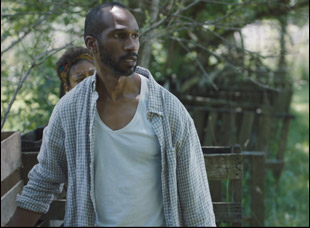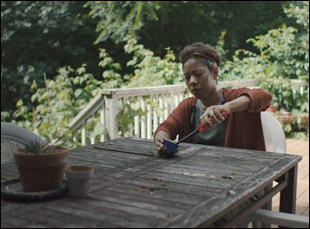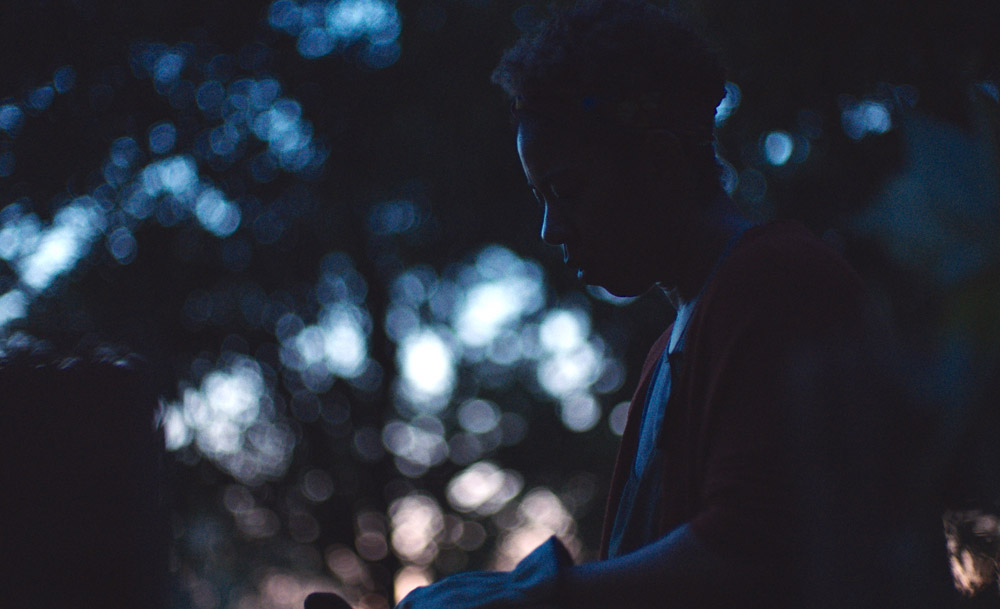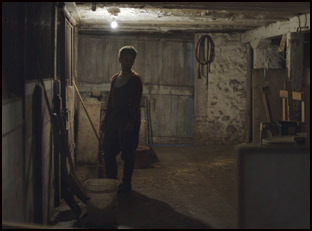A year ago when Charlie Schmidlin was about to make his first dramatic short, long intended to be a tribute to the farm that his family had tended to for generations, his parents began to think about downsizing and selling it. There was no pressure to carry on their legacy as far as tending to the place, but holding considerable significance personally when it was where he spent his formative years, and culturally when it was a rare Black-owned CSA (community supported agriculture), he was hardly ready to move on.
“The conversation of either myself or one of my siblings never really came up because we were given the latitude and support to try to find our own path in the world,” recalls Schmidlin. “So the idea of the film really came about asking in this day and age [about] the personal choice of what responsibility does one owe to their family or to their way of life.”
Besides ensuring that the land wasn’t going to be redeveloped as an apartment complex – it ultimately went to another member of the CSA, Schmidlin found a novel way to preserve the farm’s spirit by committing it to film with “Gossamer,” a beguiling short that centers on Imani (Krystel Mcneil), the daughter of a longtime agronomist named Leonard (Anthony Irons) who is thinking about hanging things up with little help to run the place after the passing of his wife. That absence isn’t spoken of much between the two, but the disappearance of a chicken prompts a discussion of the farm’s future, which Leonard has quietly begun to plan for without letting Imani on about by contacting a local buyer (Dan Waller). As Imani comes to question her connection to the land and to her father, “Gossamer” draws one closer to both in its unstinting level of physical and emotional detail observing the difficult process of letting go of a place that means so much while having it live on in the mind forever.
Anchored by stirring central performances from McNeil and Irons, “Gossamer” lets the drama inside of it emerge organically as if it were a well-cared for crop that is ripening before your eyes and with the film’s scheduled festival run shifting largely online as a result of the COVID-19 pandemic following its premiere earlier this year at the Maryland Film Festival, it has become a refreshing presence in the shorts selections at this week’s Blackstar Film Festival, which has gone virtual, and Sidewalk Film Festival which remains physical as a drive-in experience in Birmingham, Alabama. With “Gossamer” starting to make its way into the world, Schmidlin graciously took the time to talk about its origins, making the experience of filming it a homecoming not only for himself, but for his cast and crew, and how the film resonates differently when the importance of family farms has been revealed during this time of need.
It’s been a longstanding goal of mine to make a film set on a farm, simply because that’s the environment in which I grew up, on a farm about 40 miles outside of Chicago. Just looking at certain specific examples in cinema, there was never quite an experience that matched what I felt day to day living on a farm, so “Gossamer” really came out of the desire to replicate those certain tangible details – sounds, processes, chores, the way visual aspects of a farm pull together. Everybody has that hill on which to die in terms of certain details about their experience that they’ve lived through and that’s what I felt I could offer.
And this was actually shot on the farm you grew up on, but it wasn’t still in your family’s care?
That’s been the interesting growth that the project has taken is that it started with the desire to replicate an experience and then for the longest time it lingered there as that, but more recently it transformed and the second part of the film came together, which is the idea of generational roles within a family. I grew up on this farm, but I never really quite processed what it might mean to sever that relationship to that land and to that property until the idea of leaving that property came into the fold, so in a way it was both a fulfillment of that film I was trying to create and also a farewell letter, just to simply document this space. That was in my mind while [composing] shots and descriptions of the place while editing. Having these various angles, first and foremost, it was from a narrative perspective, but in the back of my mind, I thought it’ll be good to have these shots when everything’s gone.
That fallen tree that opens up the film is so evocative. Is that something that you’ve known about for some time?
Yeah, that’s been there for at least a year, and I live in Los Angeles now, but every time I would go back and visit my parents, that tree would still be there. It fell down during a wind storm one night in the pasture and we never really tore it down, and it slowly became part of the property, so it was both natural and completely unnatural, [which made it] just the perfect image to open up a film that was all about resignation to a certain reality in these people’s lives.
The way it’s shot, where you pivot from the base of the tree to the side of it, also sets the tone for the film’s really elegant visual language that does a great job of showing the distance between these characters and their relationship to the land. How did that develop?
One thing my cinematographer Olivia Aquilina and I talked about from the very beginning of this was keeping that sense of space and atmosphere and really rooting the viewer in the main character Imani’s point of view. There’s always this very subtle procedure in film of showing a viewer a space — David Fincher’s amazing at this — showing you a location and very subtly, but extensively showing you every corner of that location that’s going to come into the forefront. I think of that shot in “Benjamin Button” in New Orleans that goes around Benjamin Button’s childhood home, and [there’s something similar] with “Panic Room.” So it was really marrying that desire to bring in these elements that are not normally seen, that you’d normally cut away from and holding the camera on those to let those seep in and really give a sense of what day-to-day life on a farm is like.
The main example of that [in the film] is the almost 360° — [it’s actually] 270° [shot of Imani] walking, looking for the chicken that has possibly escaped and has been possibly killed — we don’t know — through various quadrants of this four quadrant pasture. It was always a long shot and it’s a big ask to the viewer to watch a shot of that length, but what we found when we were blocking out the scenes, even writing the script, was that this film was always going to have a rhythm of its own. It wasn’t going to fall into a quick, fast-cut narrative structure, so it was simply a matter of letting those [natural elements] inform the shot structure and feel of the piece.

In a word, yes. There are so many drafts of this script that said the explicit and [they] completely deflated the film. [The inherent restraint] was simply because it came from real life and it was mainly based on rural Illinois family and friends that I’ve been around where we aren’t really explicit until it’s pressurized to the point where it just needs to come out. There’s a very specific rhythm and cadence to the way everyone speaks and communicates that’s not always for the best for communication, but nonetheless that’s how we found [the dramatic structure]. Everyone on the crew rallied around that, especially the actors. We looked at a lot of different actors for these various roles and tried out various trios because it is a trio of actors that need to work together in a very subtle and nuanced way together and I gained so much from Krystel McNeil, who plays Imani, and Anthony Irons, who plays her father [Leonard], and Dan Waller, who plays Rick, the guy who comes to buy the farm. They were so instrumental in bringing so much of their experience to this project and they were immediately in line with the tone we were trying to set.
The one film I kept referencing and showing to them was “Onibaba,” just [for] the tone and the way that an environment can tell you everything you need to know about a person’s situation. And to keep that restraint going was a stylistic choice we made from the beginning because when we were on set, we had little ideas and improvisations, some of which we kept in the film, but any time we noticed we were going too explicit, we just noticed a little bit of air was let out of the scene and the film in general, so we just tried to keep that question [open] of would Imani or Rick say this in this moment? What has to happen to get us to this point of finally explaining something?
The scene where Rick and Leonard, the father, are going over the appraisal for the property, we had dialogue there, and I knew [the film] was going to be rooted in Imani’s perspective, but when it came to the conversation between Leonard and Rick, I wanted to give that over to the actors and let them run with it, so I asked them to go on their own experiences and see what they came up with. We were on a tight schedule, so they just had to go away and figure out what the escalation points were, figure out how [the scene] was going to turn, and what they were going to delve into, and while we were setting up, Dan and Anthony, the two actors in that scene aside from Krystal, had their own rapport and they essentially created their own three-act structure in 25 minutes of just how this conversation was going to play out while Imani was looking at them. We came back, we sat down and we shot that scene and it’s one of my favorites because it’s just a clear distillation of what the actors brought of their personal selves into the roles and showed me something that was 10 times better honestly than what I had in the script at the beginning.
And a fun fact about that [scene] is the papers that they’re looking at for the property are the actual papers that supported the actual property, but within those, my old grade school and high school report cards were mixed in with those — I didn’t know they were in there — so Dan, at a certain point, was just flicking through them during the scene and it was awful. [laughs] He was reading off every grade I got in biology, saying [stuff], “Did you really need that D+ in freshman year of high school?” He was awesome to work with, but once he found that report card, he found his entertainment for the next half-hour.
You’ve obviously made good in the intervening years and this hardly was your first set, but when this was your first proper short, was it what you thought it would be? Was it different?
Yeah, I worked as a producer on other people’s short films and as a director on music videos, so working in Los Angeles for the past 10 years on other people’s sets, it really gives you little tabs in your mind that you open and make little notes like, “Okay, that’s an interesting shot, maybe I’d do this” or “that’s an interesting piece of equipment, let’s find that for maybe something that would give a nice color to another scenario.” Just working in various roles gave me a comfort in the unknown of what will happen when you make a film, which is to be able to say, “I’m okay not knowing the best way of doing this is” and asking the people around you to then offer their expertise because from top to bottom, everybody who worked on this were all-stars in their respective roles.
Rothwell Polk, my producer, is a commercial producer/director in his own right, Abigail [Childs] is a production designer who is a good friend out here in L.A., and Olivia [Aquilina, the director of photography] is now based in L.A., but she’s from Chicago as well, and she shot a ton of stuff with Nike and a bunch of short films, so she knows what she’s doing. Part of this was [also making it] a homecoming trip too, so I wanted a crew that was from the Chicagoland area and not only would the film be a major draw, but just being back with family or friends, and really just make this a family affair of people who wanted to be back in that space and were really interested in exploring something new. So [the production] was everything I thought it would be, simply because I’ve had the work experience enough to know how to run a set and how and when to ask for help because I just noticed that when you ask for help, nothing but good things happen.

Yeah, it’s super surreal to be releasing anything right now. You’re torn between excitement over people actually seeing the work that you’ve worked on with others for a year-plus and despair for the state of the world. What I’ve liked about this is it’s proven to give people a look into a different side of a world and people can latch onto the familial aspect and the idea of fighting for families or fighting for something that they love. From a representational standpoint, I’ve also noticed in the past few months or so the idea of small farms and community-led farms, especially black farms, are coming to the forefront in a huge way when a year ago when I was making this, they [were] becoming an ever-decreasing thing. Soul Fire Farm, based in the New York area, has been doing good work both in the food and social justice realms, and in L.A., there’s an organization called Suprmarkt that’s doing great work to provide Los Angeles, especially lower income communities with fruits and vegetables every week, and it’s great that in the span of a year, it went from there being a few examples of this world to now being pretty rampant. I’m proud of that and I’m happy that if anyone might see this film, that hopefully it might tell them a world like this is out there and they might look into their own community to support them.
“Gossamer” will next screen online at the Blackstar Film Festival as part of the Kindred Shorts Program at 5:30 pm EST, at the Sidewalk Film Festival in Birmingham, Alabama as part of the Black Lens Program on August 27th at 8 pm.





